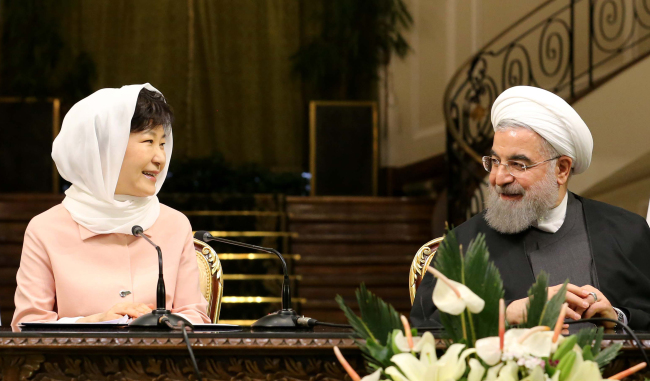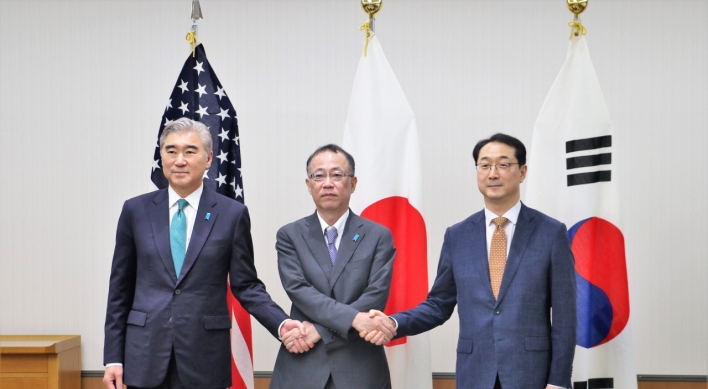Korea-Iran summit paves way for $45.6b business deals
Park, Rouhani agree on denuclearization
By 임정요Published : May 2, 2016 - 18:30
TEHRAN -- South Korean President Park Geun-hye held landmark summit talks with her Iranian counterpart Hassan Rouhani on Monday and reached provisional deals in construction and energy worth $45.6 billion, the highest-ever at a single summit, Cheong Wa Dae said.
Involving 66 memorandums of understanding, 30 nation-scale projects and a state-backed financial program worth $25 billion, as well as the largest-ever economic delegation, South Korea seeks to gain a foothold in the promising Iranian market hoping for a second Middle East boom.

Both countries also echoed a need for denuclearizing the Korean Peninsula and eradicating terrorism from the Middle East.
“President Rouhani and I have exchanged meaningful opinions on the common concerns of both countries,” said Park in a joint press conference following the bilateral summit held at Tehran’s Saa’dat abad Palace.
The summit was the first since the two countries established diplomatic relations back in 1962.
Her visit came some three months after the U.N. lifted its years-long sanctions on Iran in January in recognition of the latter’s consent to a restricted nuclear program.
“As for regional issues, I have underlined the importance of Iran’s compliance of the U.N. resolution against North Korea’s nuclear activities,” Park said.
The Iranian state leader upheld Park’s statements, placing much focus on regional peace.
"It is our basic principle to eliminate all dangerous nuclear weapons both from the Korean Peninsula and the Middle East,” Rouhani said.
The two state leaders also pledged cooperation in improving Iran‘s stalled economy and offering business opportunities to South Korean companies.
“We will work to restore bilateral trade and investment, so that Iran may soon rebuild its economy and normalize its growth,” Park said.
A meeting with Iran’s Supreme Leader Ayatollah Ali Khamenei was scheduled later in the day.
An Chong-bum, senior presidential secretary for economic affairs, said that the bilateral trade volume is likely to bounce back to the pre-sanction levels.
The South Korea-Iran trade volume, which stood at $17.4 billion in 2011, plummeted by 65 percent to a $6.1 billion as of end-2015.
Shoring up the government’s economic achievement were a series of massive infrastructure and energy deals.
A notable infrastructure deal was the $5.3 billion provisional contract to lay a 541 kilometer-long inland railroad connecting Esfahan and Ahwaz.
Besides the $11.6 billion worth of deals that were signed during the summit, Korea’s state-run and private companies expect to further expand their profits during the coming years.
Citing the Iranian government’s five-year development map, which seeks to achieve an annual growth rate of 8 percent by year 2020, South Korea’s Land Ministry and Maritime Ministry offered their partnership in constructing railroads and harbors in Iran.
The Land Ministry is also tapping into Iran’s water resources management sector, focusing on dealing with water scarcity in the Middle East state.
With an annual precipitation of 300 mm, Iran was designated by the World Resources Institute as the world’s 16th water-stressed nation, leading to forecasts that its water management market size will soar to $4.4 billion won in 2018 from $2.9 billion in 2013.
The Iranian president, too, repeatedly quoted water shortage as the country’s top four crises, along with unemployment, inflation, and drug abuse.
But the most profitable sector by far is the energy reconstruction business, involving Iran’s rich content in natural energy resources.
The country, ranked the world’s single-largest holder of natural gas and the fourth largest of crude oil, has pledged to invest $500 billion in energy development projects by year 2025.
“Adding to its unrivaled amount of undeveloped resources, Iran is also marked for its distribution-optimized location, nestled in between Central Asia, Middle East and Eastern Europe,” said An.
The largest orders so far in the energy sector are the $10 billion worth Bahman oil refinery project and the $1.5 billion Iran-Oman submerged gas transportation pipeline construction, according to the senior Cheong Wa Dae official.
By Bae Hyun-jung, Korea Herald correspondent (tellme@heraldcorp.com)










![[New faces of Assembly] Architect behind ‘audacious initiative’ believes in denuclearized North Korea](http://res.heraldm.com/phpwas/restmb_idxmake.php?idx=644&simg=/content/image/2024/05/01/20240501050627_0.jpg&u=20240501225745)
![[Music in drama] Rekindle a love that slipped through your fingers](http://res.heraldm.com/phpwas/restmb_idxmake.php?idx=644&simg=/content/image/2024/05/01/20240501050484_0.jpg&u=20240501151646)






